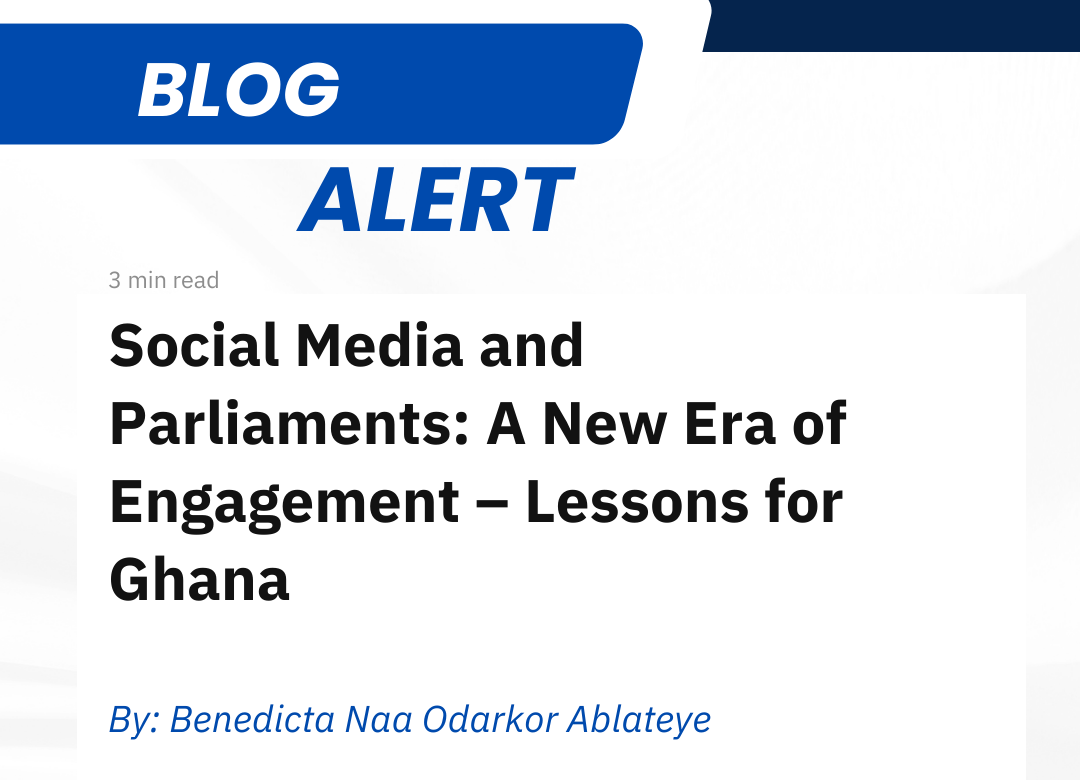By Benedicta Naa Odarkor Ablateye, Communications Officer, ACEPA
Not long ago, keeping up with parliamentary proceedings meant tuning into the evening news, waiting for the next day’s newspaper, or physically sitting in the gallery. Today, all it takes is a scroll through your phone. According to the World e-Parliament Report 2024, 98% of parliaments now use social media to engage the public – making it the most widely adopted communication channel in modern legislatures.
Social media has reshaped how lawmakers communicate with citizens. Legislators can now provide real-time updates, explain complex policies in simple language, and respond directly to public concerns. This shift has brought politics closer to the people than ever before.
Yet, the potential remains largely untapped. Despite widespread usage, only 35% of parliaments have a structured strategy for online engagement (World e-Parliament Report 2024). Without a clear plan, communication risks being ad hoc, reactive, or ineffective.
The Importance of Strategy
Data from the 2018 World e-Parliament Report shows that 67% of MPs were active on Facebook and 40% on Twitter. Institutional use is even higher, with 70% of parliaments on Facebook and 68% on Twitter. Clearly, social media is here to stay – but usage alone is not enough. Many parliaments struggle to use these platforms strategically to inform, educate, and build public trust.
Challenges such as the digital divide, misinformation, and limited translation of online dialogue into real-world outcomes persist. Still, the potential of social media to enhance transparency and participation remains strong. Around the world, parliaments are leveraging digital tools to open up governance and strengthen public engagement.
What Other Countries Are Doing
The Connected Parliaments 2020 report by the Westminster Foundation for Democracy highlights global efforts to make legislatures more inclusive and responsive – especially for women and minority groups. Countries are increasingly investing in digital tools to deepen civic engagement and transparency.
- Sierra Leone launched a parliamentary app with over 1,000 downloads, offering easy access to legislative content. Their Parliament has also embraced e-books, automated proceedings, and Facebook live streams to keep over 42,000 followers informed.
- The UK Parliament responded to COVID-19 by creating a voting app and now uses X (formerly Twitter), with over 1.6 million followers, to simplify complex legislative debates through infographics, videos, and plain-language posts.
- Canada’s House of Commons utilizes online budget tools developed by the Institute of Fiscal Studies and Democracy (IFSD) to both educate the public and gather feedback during budget planning.
Despite these innovations, many parliaments still treat social media as a one-way communication channel, missing out on opportunities for genuine interaction and public input.
What Ghana Can Learn
Ghana has made commendable strides with its parliamentary mobile app, offering access to the Constitution, MP profiles, legislative documents, and more. However, the current ecosystem – comprising the app, a standard website, and occasional social media use – falls short of fostering real interactivity or meaningful public participation.
The key challenge is not access to information, but the absence of digital tools that empower citizens to contribute actively to the legislative process.
A Roadmap for Ghana’s Parliament
To enhance transparency and citizen engagement, Ghana’s Parliament should consider a phased, strategic approach:
- Upgrade the Ghana Parliamentary App to include interactive features, feedback options, and structured pathways for citizen input.
- Host live discussions on platforms like Facebook and X, allowing the public to ask questions and engage with MPs in real time.
- Introduce participatory tools such as polls, surveys, and budget simulators to feed citizen input directly into committee work and national budget discussions.
- Partner with development agencies and local tech hubs to ensure these platforms are sustainable, secure, and regularly updated.
The Time is Now
Social media use in Ghana continues to rise, with approximately 7.95 million user identities in early 2025 – around 23% of the population (DataReportal, 2025). Usage is fairly balanced by gender (57% male, 43% female), and platforms like Facebook remain dominant.
This growing digital landscape offers a golden opportunity. By investing in interactive, citizen-centered digital tools, Ghana’s Parliament can not only modernize its communication but also align more closely with international best practices in legislative openness and participatory governance.
References
- https://www.agora-parl.org/sites/default/files/agora-documents/20241105_IPU_World_eParliament_2024_EN-Proof6%20%281%29.pdf
- https://www.youtube.com/camaradosdeputadosoficial
- https://www.wfd.org/sites/default/files/2022-06/wfd-connected-parliaments.pdf
- https://library.bussola-tech.co/p/digital-transformation-in-the-parliament?utm_source=publication-search
- https://datareportal.com/reports/digital-2025-ghana


All Comments:
[…] Read our blog on “Social Media and Parliaments: A New Era of Engagement – Lessons for Ghana” […]
Comments are closed.